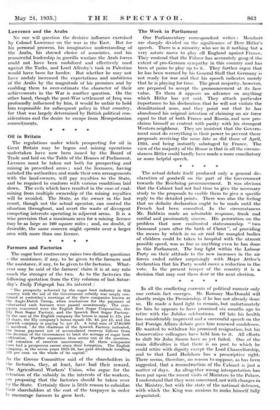Farmers and Factories The sugar beet controversy raises two distinct
questions —the assistance, if any, to be given to the farmers and the assistance, if any, to be given to the factories. What- ever may be said of the farmers' claim it is at any rate much the stronger of the two. As to the factories the following quotation from the City columns of last Satur- day's Daily Telegraph has its interest : " The prosperity achieved by the sugar beet industry in this country with the aid of the Government subsidy was amply con- firmed at yesterday's meetings of the three companies known as the Anglo-Dutch Group, when resolutions for the payment of substantial cash bonuses were passed unanimously. The com- panies cm-lei-kited were the English Beet Sugar Corporation, the Ely Beet Sugar Factory, and the Ipswich Beet Sugar Factory. In the case qf the English company the bonus is equal to 12s. per share, the Ely company's bonus equals 13s. 4d. per £1, and the Ipswich company Is paying -7s. per £1. A total sum of £740,000 is involved. As the chairman of the Ipswich Factory -indicated,. the bonus payment out of accumulated reserves follows from, the decision of the GovernMent to limit the acreage of sugar beet cultivation. -"Further expansion thus seems out of the question, :aid retention of .reserves unnecessary. All three companies have had a prosperous career since their formation. The English ompany, in the seven years 1928-34, has paid dividends totalling 115 per cent. on the whole of its capital."
As the Greene Committee said of the shareholders in the factories, they, at least, have had their reward. The Agricultural Workers' Union, who argue for the retention of the subsidy in the interests of the workers, are proposing that the factories should be taken over by the State. Certainly there is little reason to subsidize their shareholders at the cost of the taxpayer in order to encourage farmers to grow beet.














































 Previous page
Previous page